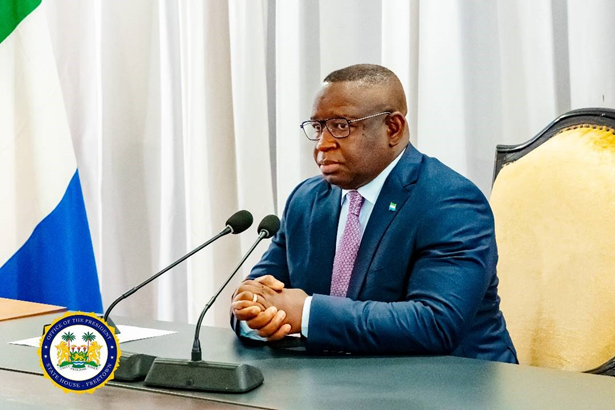By Marcus Bangura: Op-Ed/Commentary
In recent years, the dream of national unity and cohesion in Sierra Leone has felt increasingly elusive. Despite the country’s wealth of natural resources, the divide between regions, ethnicities, and social classes continues to widen. As the economic situation deteriorates, marked by rising inflation, youth unemployment, and stagnating development, the call for unity grows louder, but so does the frustration of those left behind. The truth is undeniable: Sierra Leone’s path to unity lies not in empty rhetoric or symbolic politics, but in economic equity.
For decades, Sierra Leone has been described as a paradox, a resource-rich nation with a persistently poor population. Our soils yield diamonds, rutile, bauxite, gold; our waters teem with fish; our farmlands are fertile and our agricultural potential vast. Yet, we remain heavily reliant on foreign aid, while most of our citizens struggle to meet basic needs. Inflation, despite conservative government estimates, continues to erode purchasing power, particularly in urban areas, while rural communities remain grossly underdeveloped and underserved.
This inequality is not coincidental. It is the product of deep-seated structural imbalances in the distribution of wealth and opportunity, many of which stem from the way our natural resources are managed, or more accurately, mismanaged. The lack of fairness in resource allocation continues to fuel resentment, especially in communities that contribute significantly to national revenue but receive little to no return.
The mining sector illustrates this clearly. Diamonds from Kono and Bo, iron ore from Tonkolili, rutile from Moyamba, and gold from Koinadugu and Falaba should be driving regional development. Instead, these areas remain among the least developed, with inadequate infrastructure, limited healthcare, and poorly equipped schools. Residents are rarely found in decision-making positions within mining companies, and revenues often bypass the very communities most impacted by extractive activities. Worse still, smuggling and corrupt deals facilitated by both foreign entities and domestic elites, drain public resources, depriving the government of much-needed funds for essential services.
The same pattern of exclusion exists in the agriculture and marine sectors. Farmers continue to rely on rain-fed agriculture, with little meaningful government support, despite substantial international donor funding aimed at improving food security. Meanwhile, fishermen in coastal districts contend with depleting fish stocks due to unregulated and often illegal foreign trawlers, operating with minimal oversight and providing scant benefit to local communities. All the while, food insecurity worsens and the cost of living rises.
When people feel that the wealth of their country is not meant for them, national unity becomes a hard sell. This is the reality for millions of Sierra Leoneans. Discontent simmers beneath the surface, manifesting in periodic protests, election-related tensions, or calls for regional autonomy. These are not simply political actions; they are emotional responses from communities that feel excluded from the national narrative.
This inequality also infects our politics. For many, elections are not about policy or ideology, they are about “taking turns” at the national cake. This has bred a dangerous political culture where power is sought not to serve, but to control resources. Governance becomes a contest of loyalty rather than merit. The politicization of state institutions, particularly in the security and justice sectors, further undermines public trust and fuels division.
But it doesn’t have to be this way. We must place equity at the heart of governance. This begins with reforming how resources are governed. Contracts with mining and fishing companies must be renegotiated to ensure that host communities benefit directly from the exploitation of their natural assets. Royalties should be transparently accounted for, with a fixed share earmarked for local development. The National Minerals Agency (NMA) and the Ministry of Mineral Resources must be empowered and held accountable to enforce compliance and combat smuggling. Corruption, at all levels, must be confronted decisively.
Equity also demands serious reinvestment in agriculture and marine resources, not just as economic drivers but as platforms for empowerment. When farming and fishing communities receive real investment in infrastructure, tools, training, and market access, they will not only become more productive but also feel more connected to the national economy.
Reforming the public sector is equally crucial. Health, education, energy, and social services must be delivered equitably across all regions, not just in Freetown and other urban centres. The ongoing economic crisis, marked by austerity and inflation, will only deepen divisions unless meaningful safety nets are introduced to protect the most vulnerable.
Equally important is the rebuilding of civic education and national consciousness. Unity requires more than shared geography—it requires a shared purpose. Citizens must be educated about their rights and responsibilities, and more importantly, see the tangible benefits of their citizenship.
Some progress has been made. Institutions like the NMA have taken steps toward improving transparency in the extractive sector. Civil society continues to hold public officials accountable. But these are incremental gains. What is needed is a bold national commitment, a leadership vision that values fairness, inclusion, and long-term nation-building over short-term political gain.
As we approach another chapter in our democratic journey, we must remember unity is not just about peace. It is about justice. It is about ensuring that every Sierra Leonean—regardless of tribe, region, or class, has a fair shot at a dignified life. Until we bridge the gap between our country’s vast wealth and the wellbeing of our people, national cohesion will remain a dream deferred.
Sierra Leone’s wealth belongs to all Sierra Leoneans. Let us make that truth a lived reality.


